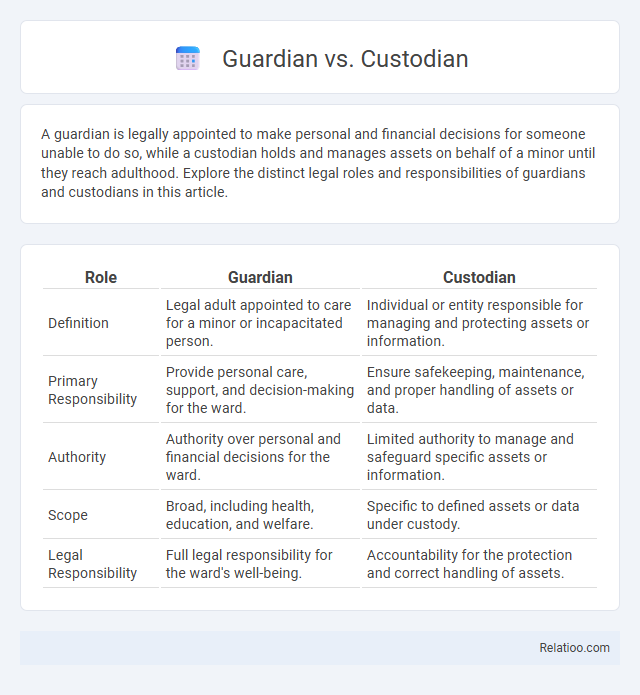A guardian is legally appointed to make personal and financial decisions for someone unable to do so, while a custodian holds and manages assets on behalf of a minor until they reach adulthood. Explore the distinct legal roles and responsibilities of guardians and custodians in this article.
Table of Comparison
| Role | Guardian | Custodian |
|---|---|---|
| Definition | Legal adult appointed to care for a minor or incapacitated person. | Individual or entity responsible for managing and protecting assets or information. |
| Primary Responsibility | Provide personal care, support, and decision-making for the ward. | Ensure safekeeping, maintenance, and proper handling of assets or data. |
| Authority | Authority over personal and financial decisions for the ward. | Limited authority to manage and safeguard specific assets or information. |
| Scope | Broad, including health, education, and welfare. | Specific to defined assets or data under custody. |
| Legal Responsibility | Full legal responsibility for the ward's well-being. | Accountability for the protection and correct handling of assets. |
Guardian vs Custodian: Key Distinctions
Guardians have legal authority and decision-making power over a person's personal and financial matters, while custodians primarily manage assets on behalf of minors without decision-making authority beyond asset management. Your choice between a guardian and custodian depends on whether you need comprehensive personal care and financial control (guardian) or simply asset oversight for a minor's benefit (custodian). Understanding these key distinctions ensures proper legal protection and effective management tailored to your specific responsibility needs.
Legal Roles: Guardian Explained
A guardian is legally appointed to make personal and healthcare decisions for an individual unable to do so, ensuring their well-being and safety. Unlike custodians or protectors, a guardian holds authority over both daily life choices and legal matters, often appointed through court proceedings. Understanding your role as a guardian means recognizing the responsibility to act in the best interest of the ward while navigating complex legal obligations.
Custodian Responsibilities: An Overview
Custodian responsibilities primarily involve managing and safeguarding assets or information on behalf of others, ensuring proper maintenance and control. Unlike guardians who focus on personal welfare or protectors who enforce protective measures, custodians emphasize custodial care, record-keeping, and compliance with relevant regulations. Their duties encompass secure handling, accurate documentation, and facilitating access while preventing unauthorized use or damage.
Authority and Decision-Making Powers
A guardian holds broad legal authority to make personal, health, and financial decisions for a ward, often appointed by courts when individuals are incapacitated. A custodian typically manages specific assets or property under fiduciary obligations, with limited decision-making powers confined to the scope of custody agreements. A protector, common in trust law, wields oversight authority to supervise trustees, with the power to remove or replace trustees but no direct control over the trust property itself.
Scope of Duties: Guardian vs Custodian
The scope of duties for a Guardian typically involves comprehensive responsibility for a person's personal well-being, including making healthcare, educational, and lifestyle decisions. In contrast, a Custodian's duties are more limited and often focus on managing and safeguarding financial assets or property rather than making personal or welfare decisions. Understanding your role clearly helps ensure appropriate legal and practical care aligned with the specific needs of the individual involved.
Duration and Termination of Roles
A guardian's role typically lasts until the ward reaches adulthood or until a court order terminates the guardianship, often involving ongoing court supervision. Custodians manage assets or property under a trust or custodial arrangement until a specified age or event triggers the transfer or termination of control. Protectors oversee trusts with powers that can be revoked or altered based on the trust deed terms or court decisions, generally serving until their designated role ends or is formally replaced.
Financial Management Differences
A guardian typically oversees a minor's overall well-being, including making financial decisions to manage assets prudently on their behalf. A custodian holds and manages financial accounts or property until the beneficiary reaches a specified age, with limited authority strictly related to the custodial assets. Your protector focuses primarily on safeguarding your financial interests and assets during legal or health incapacity, ensuring funds are used according to your directives.
Child Welfare and Well-being Focus
Guardians hold legal responsibility for making decisions about a child's welfare, including education, healthcare, and general well-being, ensuring the child's best interests are prioritized. Custodians typically manage the day-to-day care, supervision, and housing of the child, focusing on the child's immediate safety and daily needs. Protectors safeguard the child from harm and abuse, monitoring the child's environment to maintain safety and emotional security crucial for healthy development and well-being.
Legal Processes for Appointment
Guardians, custodians, and protectors are appointed through distinct legal processes tailored to their roles; guardians undergo court proceedings to obtain formal guardianship over minors or incapacitated adults, requiring thorough evaluation and court approval. Custodians, often designated in financial or trust contexts, are appointed according to specific statutory guidelines or trust agreements without the need for extensive court intervention. Protectors, appointed by trust documents or legal instruments, supervise trustees' actions and ensure the trust's intent is upheld, generally requiring less formal court involvement but governed by precise fiduciary rules.
Choosing Between a Guardian and a Custodian
Choosing between a guardian and a custodian depends on the level of legal responsibility and decision-making authority required for a minor or incapacitated person. A guardian is typically appointed to make comprehensive personal, medical, and financial decisions, whereas a custodian primarily manages financial assets under the Uniform Transfers to Minors Act (UTMA) or Uniform Gifts to Minors Act (UGMA). Evaluating the extent of control needed over personal care versus financial management is crucial in determining the appropriate role.

Infographic: Guardian vs Custodian
 relatioo.com
relatioo.com